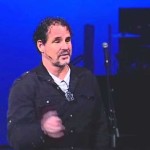We run our website the way we wished the whole internet worked: we provide high quality original content with no ads. We are funded solely by your direct support. Please consider supporting this project.

God’s Ways Are Higher Than Ours
A frequently quoted passage from the Old Testament comes from Isaiah 55. It reads:
…my thoughts are not your thoughts,
neither are your ways my ways…
As the heavens are higher than the earth,
so are my ways higher than your ways
and my thoughts than your thoughts (vss. 8-9).
I’ve often heard this passage used to justify people embracing incoherent beliefs or to explain why we can trust God when we don’t understand what God is doing. But this passage is not talking about embracing the mystery of God. It’s about something much more profound and challenging in light of the tension around racial division that we are experiencing in our world today. To explain this, let me provide a little background.
God called Abraham to be a unique covenant partner with him and to eventually form a unique nation through which “all peoples on earth will be blessed” (Gen. 12:1-3). This calling follows immediately after God’s judgment on Babel where people had to be scattered because they were trying to reach heaven on their own. (See post on Reversing Babel.) God, who always starts new projects with a “mustard seed” and who is always incredibly patient, began selectively carving out a distinct nation from among the descendants of Abraham.
For his own sovereign reasons, God decided to work with Isaac’s lineage instead of Ishmael’s and with Jacob’s rather than Esau’s. He then steered the descendants of Jacob down into Egypt to incubate them as a distinct tribe for four centuries. When they had grown to a sufficient size, and when the destructive sin of the Canaanites had become intolerable (Gen. 15:16), God delivered them out of Egypt, and planted his people in “the promised land.”
In doing all this, God was raising up a distinct people for himself who would know him and walk in his ways. But the ultimate goal, we must always remember, was to use this chosen nation to bless the whole world. Indeed, God wanted Israel to be a nation of servant priests whom he would use to reverse Babel—that is to reunify humans by graciously bringing heaven down to us—and bring the whole world back together under his loving Lordship.
This vision of a reunited and reconciled humanity is hammered home with increasingly clarity and strength throughout the Old Testament. For example, Jeremiah looks forward to the time when “all nations will gather in Jerusalem to honor the name of the Lord” (Jer. 3:17; 27:7). Zechariah prophesies of a time when the Lord will “be king over the whole earth” so that he will be the only Lord confessed among all people (Zech 14:9). And Joel prophesies of a time when God’s Spirit would be poured out “on all people” (Joel 2: 28).
But the prophet who most forcefully captures God’s vision of a reunited and reconciled humanity is Isaiah. From the start the Israelites (like so much of the church today!) had a tendency to define themselves over and against other people rather than as the servants of other people. They were guilty of their own form of ethnic idolatry. Through Isaiah the Lord confronts this idolatry and reiterates his age-long goal of reaching all people.
In chapter 55, for example, the Lord announced that anyone who was thirsty or hungry was invited to come and feast at his banquet table for free (vss. 1-2). He promised all who came to his feast that he would bring them into the “everlasting covenant” that he “promised to David” (vs. 3). For, the Lord says, David was raised up not just to be the earthly king of the Jews but to be a “witness” and “ruler” for all people (vs. 4). It’s clear from this that God’s goal was always to incorporate all people into his covenant with Israel. This universal goal, as well as God’s promise to have a king like David rule all people, is in principal fulfilled in Christ.
The Lord reiterates his universal goal further when he goes on to say that his chosen people will “summon nations you know not, and nations you do not know will come running to you” because the Lord “has endowed you with splendor” (vs. 5). And he called on all the “wicked” of the world to “forsake their ways” while promising to “freely pardon” them if they would do so (vs. 7).
Inviting all to the banquet table of Yahweh was, in fact, the job of the Israelites all along. But, as I said above, many had unfortunately forgotten this. At this point we read about the thoughts of God. Let me quote it again:
…my thoughts are not your thoughts,
neither are your ways my ways…
As the heavens are higher than the earth,
so are my ways higher than your ways
and my thoughts than your thoughts (vss. 8-9).
He’s talking about his vision to reach all humans! He is in effect saying to his chosen people;
Your way of thinking is narrow, ethnically centered, and idolatrous. But my way of thinking has always been universal. As high as the heavens are above the earth is how much broader is my heart for humanity than yours.
While people since Babel have always had a tendency to exalt their own tribe over others, God’s heart has always been to eventually reverse Babel and reunite humanity under him.
God’s “higher ways” are found throughout Isaiah. For example, Isaiah prophesies of a day when “the mountain of the Lord’s temple will be established as the highest of the mountains” so that “all nations will stream to it” (Isa 2:2). He foresees a time when “all people” will behold “the glory of the Lord” (Isa 40:5) as they gather together at God’s “holy mountain” (Isa 56:7). This will be a time when “the Sovereign LORD will make righteousness and praise spring up before all nations” (Is. 61:11) as he gathers “the people of all nations and languages” to “come and see my glory” and as he inspires “all people” to “come and bow down before” him (Isa 66:18, 23).
God’s ways are not our ways, for our ways tend to be in line with Babel. It was true of ancient Israel, and it tends to be true of the Church today. But, fortunately, God’s ways always ultimately triumph. And the one in whom they triumph is Jesus Christ.
_____
art: “Impression III (Concert)”
by: Wassily Kandinsky
date: 1911
Category: General
Tags: Blessing, Kingdom of God, Love, Racial, Unity
Topics: Ethical, Cultural and Political Issues
Related Reading

Lighten Up: Listening for the Voice of the Father
Christian comedian Michael Jr. posted this video last week for Father’s Day. What it says about love and connection and God in just a few minutes is so lovely. Enjoy.

Christus Victor Atonement and Girard’s Scapegoat Theory
Many of the major criticisms of Crucifixion of the Warrior God that have been raised since it was published four weeks ago have come from folks who advocate Rene Girard’s understanding of the atonement. A major place where these matters are being discussed is here, and you are free to join. Now, I have to…

Living Into the Future
Why didn’t God create a “perfect world”? Here’s Greg’s response to that question. See more at The Work of the People.

Why is the World Still So Messed Up?
Through the Incarnation, Jesus made a way for our union with God. In addition, Jesus’ death and resurrection defeated the powers of evil. This should then lead us to ask: Why do we have to continue to fight evil? In fact, if the powers are defeated, a more basic question is: Why is the world still…

Sermon Clip: The Worst of Sinners
In this short clip, Greg Boyd discusses Paul’s definition of love. In the full sermon, Greg talks about how in this dog eat dog world, we’re programmed to judge others. But to love others with unsurpassable worth, we must ascribe worth to them at cost to ourselves. In this sermon, Greg talks about how to…

Revolting Against Judgment
A few years ago, I committed to blessing all people at all times. (See yesterday’s post for more about this.) The first thing I noticed was how many “non-blessing” thoughts I had about people. I wasn’t very aware of it before, but my brain often created a running commentary on the people I observed or…
